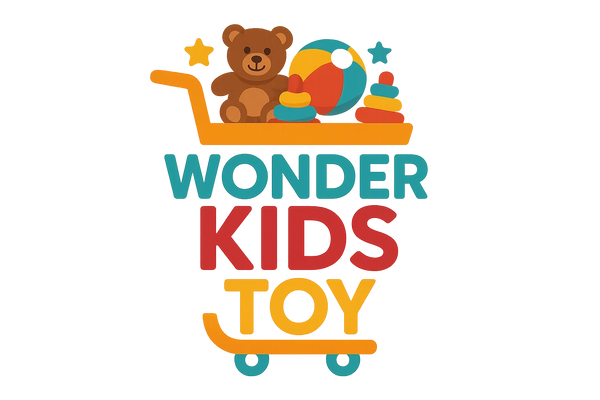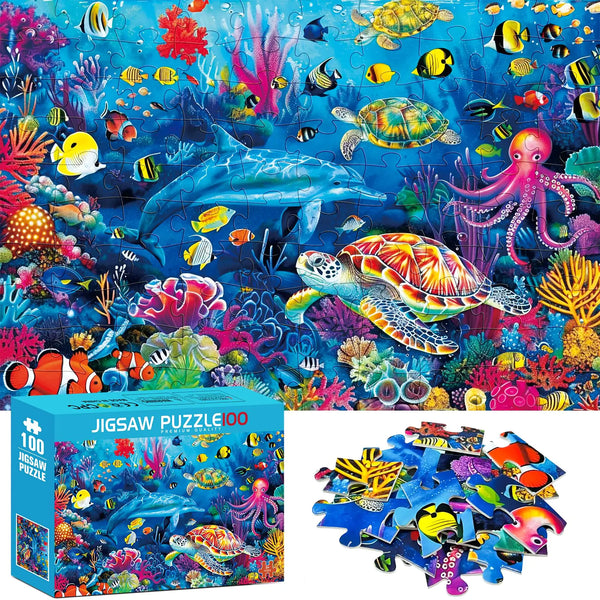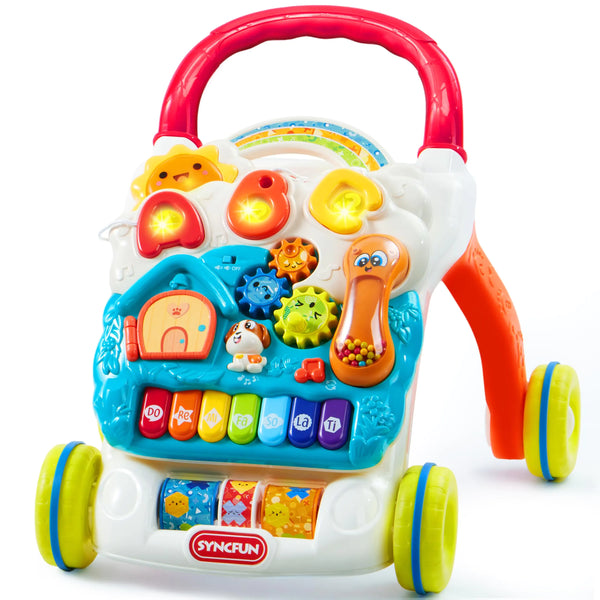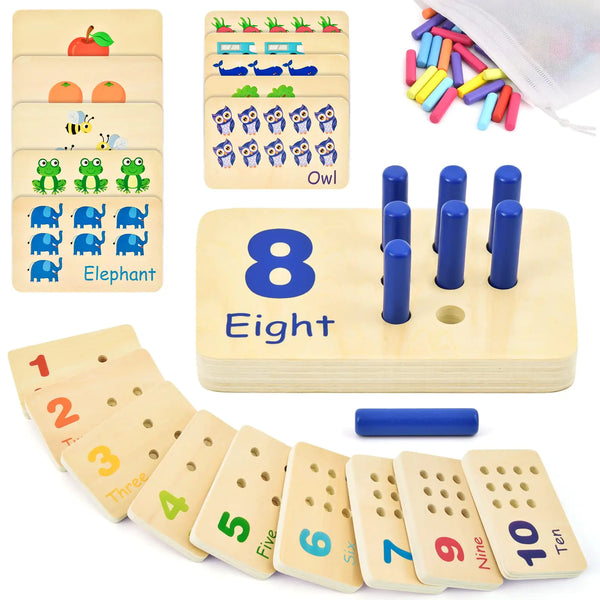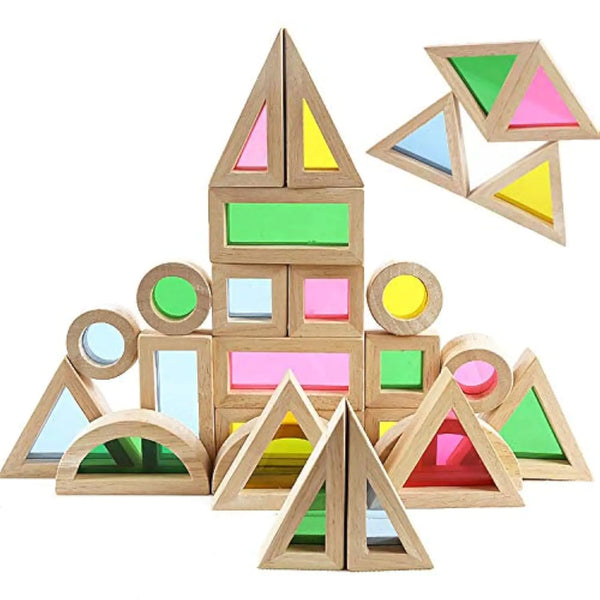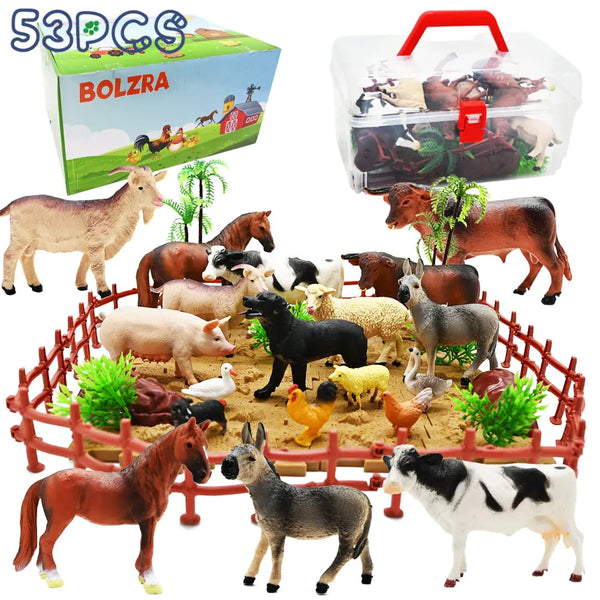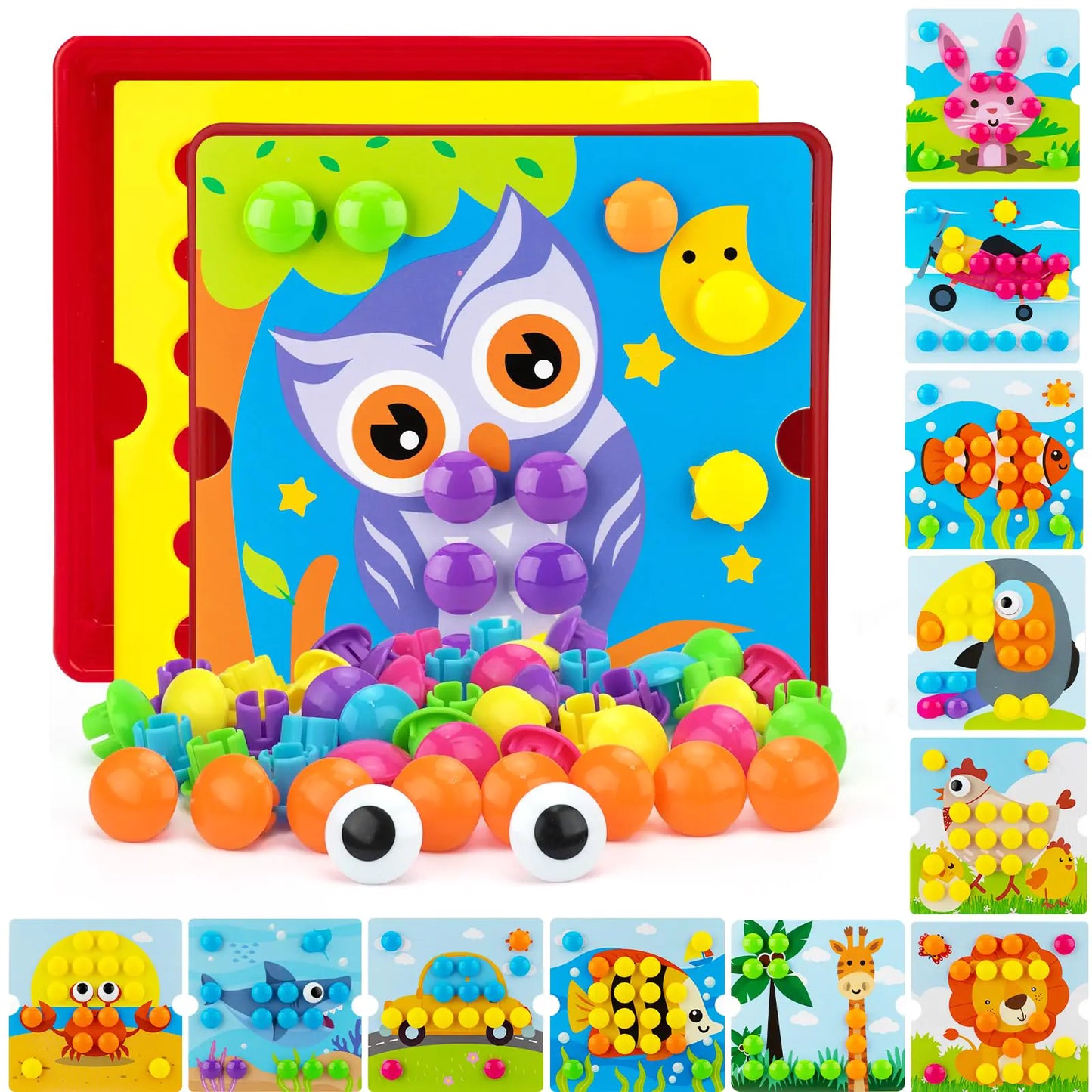Educational toys serve as an engaging gateway for children to build confidence and essential skills. Through imaginative play and interactive learning, these toys offer a hands-on approach to education that can foster creativity, cognitive development, and social skills. By incorporating educational toys into their playtime, children can enjoy a fun and enriching experience that prepares them for academic success and boosts their self-esteem.
Unlocking Creativity with Educational Toys

Sparking Imagination Through Play
As a parent, I've seen firsthand how educational toys can light up a child's imagination. Playtime is more than just fun; it's a fertile ground for creativity. With the right toys, kids can embark on epic adventures, conjure fantastical worlds, and become the heroes of their stories—all from the comfort of the living room.
Educational toys entertain and empower our little ones to think outside the box. They learn to see the world as it is and as it could be, which is a powerful component of confidence-building. Here's a quick list of benefits I've observed:
- Encourages independent thinking
- Fosters problem-solving skills
- Nurtures storytelling abilities
By giving children the tools to create and explore, we're not just keeping them occupied—we're helping them develop the skills they'll use for a lifetime.
Role-Playing and Storytelling
I've seen firsthand how role-playing and storytelling can be a game-changer for kids. It's not just about having fun—though that's a massive part—it's about stepping into someone else's shoes, which can be a powerful experience. By taking on different roles, kids learn empathy and problem-solving naturally and engagingly.
Educational toys that encourage role-playing and storytelling are like keys that unlock a child's potential. They get to create and navigate through their narratives, which boosts their confidence as they make decisions and see the outcomes of their choices. Here's why I think these toys are a must-have:
- They foster creativity and imagination.
- Kids learn to express themselves and their ideas.
- They provide a safe space for children to explore emotions and social roles.
Remember, every time a child tells a story or acts out a scenario, they're not just playing—they're building skills for life. It's about giving them the tools to understand the world around them and their place in it.
So, let's encourage our little ones to dream up worlds, characters, and adventures. After all, today's pretend play could be the first step toward tomorrow's real-world achievements.
Artistic Expression with Crafty Kits
I've seen firsthand how crafty kits can light up a child's world. Crafting is not just about making something pretty; it's a gateway to mastering new skills and expressing emotions. Crafting can be a powerful confidence booster as kids see their visions come to life. It's incredible to watch their pride swell when they hold up a finished piece, knowing it's all their work.
Artistic expression isn't just about the end product; the process counts. As kids mix colors, shape models, or place beads, they make many tiny decisions that enhance their problem-solving skills and attention to detail. Here's a quick rundown of what these kits can include:
- Coloring supplies (crayons, colored pencils, markers)
- Painting sets (watercolors, easels, brushes)
- Craft kits (sticker sets, modeling clay, sand art)
- Drawing boards and sketch pads
Encouraging your child to engage with art is like giving them a language all their own. It's a form of communication that transcends words and allows them to convey their innermost thoughts and feelings.
Remember, every child's creativity is unique. Whether meticulously lining up stickers or boldly splashing paint, they learn to trust their instincts and develop a sense of autonomy. And that's a big win for their self-esteem.
Boosting Brain Power with Puzzles and Games

The Magic of Jigsaw Puzzles
I've always found jigsaw puzzles to be a bit magical. They start as a jumble of pieces and transform into a complete picture with just a bit of patience and problem-solving. For our kids, this transformation is not just fun. It's educational. Jigsaw puzzles are a fantastic way to boost children's brain power and build their confidence.
Puzzle-solving involves critical thinking, pattern recognition, and the development of fine motor skills. As kids work on puzzles, they learn to identify shapes and colors and figure out where each piece fits in the grand scheme of the image. This kind of challenge is great for their cognitive development.
When a child places that final piece and steps back to see the completed image, there's a sense of accomplishment that's hard to beat. It's these small victories that contribute to a child's self-esteem.
Here's a quick list of benefits that jigsaw puzzles provide:
- Enhances visual-spatial reasoning
- Improves memory and concentration
- Encourages perseverance and patience
- Offers a sense of achievement
Remember, it's not about how quickly they finish the puzzle but their journey. Celebrate each step along the way, and watch your child's confidence grow with each piece they correctly place.
Strategic Board Games for Young Minds
I've always believed that playtime is more than just fun and games. It's a chance for our kids to learn and grow. Strategic board games are a fantastic way to boost their brain power. These games require players to think ahead, plan their moves, and adapt to new situations, essential skills for success both in and out of the classroom.
- The Magic of Jigsaw Puzzles: Develops spatial awareness and problem-solving skills.
- Strategic Board Games for Young Minds: Enhances critical thinking and strategy development.
-
Memory Games to Sharpen Focus: Improves memory and concentration.
By introducing strategic board games early on, we're not just entertaining our kids; we're equipping them with the tools to tackle life's challenges.
Puzzles and games enhance cognitive skills in young minds. Board games teach science and math concepts in a fun and engaging way, fostering problem-solving and critical-thinking abilities. It's a joy to watch as they learn to outsmart their opponents and celebrate each triumph, no matter how small. These moments of victory build their confidence, teaching them that they can achieve anything with patience and strategy.
Memory Games to Sharpen Focus
As a parent, I've seen firsthand how memory games can be a game-changer for kids. They're not just fun – they're a workout for the brain. These games enhance children's focus and concentration by challenging them to remember patterns, sequences, and details. It's like watching a little muscle grow stronger with each play session.
One of the key benefits of memory games is improving working memory, which is crucial for learning and following instructions. Here's a quick rundown of how these games can boost cognitive development:
- Enhanced memory retention: Regular practice helps children hold onto information longer.
- Improved attention to detail: Spotting differences and similarities hones observational skills.
-
Quicker information processing: Children learn to think and react faster as they play.
Remember, the goal isn't to create pressure but to foster a fun learning environment where kids feel excited to challenge themselves. Celebrate their progress, no matter how small, and watch their confidence soar.
Social Skills and Teamwork Triumphs

Cooperative Play and Sharing
I've seen firsthand how educational toys can transform playtime into a collaborative adventure. When kids engage in cooperative play, they're not just having fun but learning valuable life skills. Cooperative play enhances communication skills through teamwork and social interaction, allowing children to become effective communicators.
- Encourages sharing and turn-taking
- Fosters empathy and understanding
- Builds strong social connections
By working together, kids learn to solve problems, share responsibilities, and celebrate collective achievements. It's a joy to watch them negotiate roles, articulate their ideas, and support one another.
Competitive play also has its place, promoting the articulation of strategies and emotional intelligence. However, the spirit of cooperation often leads to the most meaningful and confidence-boosting experiences for children.
Navigating Social Dynamics
As I've learned more about the impact of educational toys on social skills, I've come to appreciate their role in helping kids navigate the complex world of social dynamics. Smiling and laughter, for instance, are not just expressions of joy but also crucial non-verbal cues that facilitate bonding and communication among peers. Educational toys that encourage cooperative play can significantly enhance these interactions.
Social & Emotional Development is a cornerstone of childhood, and it's impressive to see how suitable toys can foster skills like listening, self-expression, and cooperation. Here's a quick list of benefits that come from kids playing together with educational toys:
- Encourages sharing and turn-taking
- Teaches conflict resolution
- Builds empathy and understanding
- Strengthens communication skills
By guiding our children through play, we're setting them up for a lifetime of positive social encounters. It's not just about the fun they're having now; it's about the essential life skills they're developing for the future.
Learning to Lead and Follow
I've discovered that educational toys aren't just about the fun; they're a gateway to learning essential life skills. Take puzzles, for example. They're perfect for solo play and teaching kids the art of leadership and the grace of following. When children work together on a puzzle, they learn to communicate, delegate, and take turns leading the project.
- Communication: Kids discuss which piece goes where, enhancing their verbal skills.
- Delegation: They may naturally assign roles, like who searches for edge pieces.
-
Turn-taking: Waiting for their turn teaches patience and respect for others.
It's not just about the puzzle's picture at the end; it's the journey of cooperation and shared triumph that builds their confidence.
These experiences are invaluable, mirroring real-world scenarios where teamwork and adaptability are essential. By encouraging these playful yet profound lessons at home, we're setting our kids up for success in the classroom and beyond.
The Building Blocks of Confidence

Overcoming Challenges with Construction Sets
There's something exceptional about watching your child's eyes light up as they piece together a construction set. It's not just about the fun of building; it's about their journey, tackling each challenge one block at a time. Building sets are more than toys; they're tools for growth.
As parents, we know that every little victory counts. When our kids finally snap that last piece into place, their beaming pride is palpable. It's a testament to their patience and perseverance, qualities that construction sets are incredibly effective at cultivating. And let's not forget the fine motor skills they're honing with every tiny brick they maneuver.
Construction sets offer a hands-on experience that can't be replicated by any other type of play. They encourage our children to think critically, visualize spatially, and work persistently towards a goal.
But the benefits don't stop there. These sets often introduce basic math and science principles, making them a stealthy educational tool. And when friends join in, they become a collaborative effort, teaching valuable lessons in teamwork and social interaction. Here's a quick rundown of the skills your child can develop with construction sets:
- Patience and perseverance
- Fine motor skills and hand-eye coordination
- Problem-solving and logical thinking
- Spatial awareness and structural thinking
- Basic math and science concepts
- Social skills through collaborative play
Celebrating Small Victories
I've seen firsthand how every little success builds up a child's confidence. When my kiddo completes a puzzle or nails a tricky building block structure, their eyes light up with pride. It's these small wins that pave the way for more immense achievements.
- Recognize each accomplishment
- Praise their effort, not just the outcome
- Encourage them to set new goals
By celebrating these moments, we're not just clapping for the result; we're cheering on the perseverance and problem-solving that got them there. And let me tell you, it's contagious. Once they start, they don't want to stop. It's like watching a little confidence meter go up with each success.
Remember, the goal isn't perfection; it's progress. Each step forward is worth a high-five, a hug, or a happy dance. Let's make sure our kids know we see how amazing they are, every step of the way.
Growth Mindset and Positive Reinforcement
I've seen firsthand how educational toys can be more than just playthings; they help instill a growth mindset in our kids. When they tackle a complex building set, they're not just snapping bricks together—they're learning to persevere through challenges. And when they finally complete their masterpiece, the pride in their eyes is undeniable. Celebrating these small victories goes a long way in building their confidence.
It's not about getting it right on the first try; it's about the journey of getting better, one playful step at a time.
Encouraging our children with positive reinforcement as they play and learn is crucial. Here's a simple list of affirmations I use to foster this mindset:
- "I love how you kept trying!"
- "Your hard work paid off!"
- "Look at what you've accomplished!"
These phrases are more than words; they foster a resilient, confident attitude towards life's hurdles. By integrating educational toys into our kids' daily routines, we're not just giving them something to do but preparing them to face the world with a can-do spirit.
Tech Toys for Tomorrow's Innovators

Coding Kits for Kids
I've seen firsthand how coding kits can turn the daunting task of learning to code into a fun and interactive experience for kids. These kits often include colorful components and easy-to-follow instructions that make abstract programming concepts tangible and accessible. By starting early, children can develop a foundational understanding of coding logic and problem-solving skills that will serve them well in our increasingly digital world.
Popular brands like Snap Circuits and Thames & Kosmos offer a variety of kits for different age groups and skill levels. Here's a quick list of benefits that coding kits provide:
- Encourages logical thinking and sequencing
- Enhances problem-solving abilities
- Introduces basic programming concepts
- Fosters creativity and innovation
- Prepares kids for future tech-oriented careers
Embracing the challenge of coding can be incredibly rewarding for kids. As they build their own projects and see their code come to life, their confidence soars. It's not just about learning to code; it's about learning to create and control the technology that surrounds them.
Robotics: Assembling the Future
As I delve into robotics with my kids, I'm amazed at how these tech toys shape them into tomorrow's innovators. Building a robot from scratch or programming a little bot to follow commands teaches them the basics of engineering and instills a sense of accomplishment and self-reliance.
Games that involve robotics are a fantastic way to boost their problem-solving skills. They learn to think logically and sequentially, a critical skill in academics and life. And let's not forget the fun they have in the process!
By integrating robotics into playtime, we're giving our children a head start in the digital age. They're not just playing; they're learning to create, code, and control the technology that will be a part of their future.
Here's a quick look at the benefits of robotics in play:
- Developing skills in creating and decoding codes
- Boosting self-esteem and confidence
- Establishing structural thinking and organizational skills
Clearly, these interactive learning systems are more than toys; they're the building blocks of a confident and capable generation.
Interactive Learning Apps
As a parent, I've seen firsthand how interactive learning apps can transform screen time into an educational adventure. These apps are not just games; they're gateways to new worlds of knowledge. Tech toys and educational apps engage kids in learning through play, making the experience fun and beneficial. They're designed to be intuitive, so even our little ones can navigate them easily, picking up valuable digital skills.
- Encourages independent learning
- Tailors to the individual learning pace
- Offers a variety of subjects
- Tracks progress and adapts to skill level
By incorporating interactive apps into our children's playtime, we're not just entertaining them; we're equipping them with the tools for a lifetime of learning.
Remember, the key is balance. While these apps offer a fantastic way to boost cognitive skills, mixing physical play and social interaction to foster well-rounded development is essential.
Nature and Science: Exploring the Great Outdoors

Gardening Kits for Little Green Thumbs
There's something truly magical about watching a child's excitement as they see their first plant sprout from the soil. Gardening kits are a fantastic way to introduce kids to the wonders of nature and the satisfaction of nurturing life. It's not just about growing plants; it's about developing young minds.
With a gardening kit, kids get hands-on experience with the life cycle of plants, and they learn responsibility as they care for their little green buddies. Here's a quick rundown of the benefits:
- Responsibility: Regular watering and care teach kids about commitment.
- Science: They'll learn about photosynthesis, plant biology, and the environment.
- Patience: Plants take time to grow, and kids learn to wait for the rewards.
-
Healthy Eating: Children who grow their veggies are more likely to try them!
Encouraging your child to keep a gardening journal can help them track their progress and reflect on their learning. It's a simple way to reinforce the educational experience.
Remember, the goal isn't to have a perfect garden but to cultivate a curious mind and a love for the outdoors. So, grab a gardening kit and dig in with your kiddo—it's time to plant the seeds of confidence and watch them grow!
Bug Collecting for Budding Biologists
I've always been fascinated by the tiny creatures that roam our backyards. That's why I'm a huge advocate for bug-collecting kits—they're like a treasure hunt for kids, where the backyard becomes a world of discovery. Bug-collecting can ignite a child's interest in biology and the environment, teaching them about the diversity of life right under their noses.
- Why bug collecting is excellent:
- Encourages outdoor activity and exploration
- Develops observational skills
- Introduces basic scientific concepts
By gently capturing and examining insects, kids learn respect for living things and the importance of biodiversity. It's a hands-on experience that's both educational and downright fun.
And let's not forget that these little expeditions can lead to big dreams. Maybe they're chasing butterflies today, but tomorrow, they could be leading conservation efforts. Educational toys like bug-collecting kits are more than play; they're the first step in a lifelong journey of learning and caring for our planet.
Astronomy for Starry-Eyed Dreamers
There's something genuinely magical about gazing at the night sky, right? It's a vast canvas that sparks the imagination of kids and adults alike. And astronomy toys can turn that fascination into a learning adventure for our little ones. From telescopes to planetarium projectors, these toys satisfy their natural curiosity and introduce them to the wonders of the cosmos.
Encourage outdoor STEM learning through play with toys and exploration kits. Integrate STEM activities into outdoor play to nurture curiosity and appreciation for nature. It's a perfect way to blend education with the simple joys of being outside. Here's a quick list of astronomy-themed toys that can help your child embark on a celestial journey:
- Telescopes for budding astronomers
- Solar system models to build and explore
- Star charts and constellation guides
- Interactive globes that light up the night sky
By giving children the tools to explore the universe, we're not just teaching them about space. We're opening up a world where they can dream big and aim high. The sky's not the limit; it's just the beginning.
So, let's make playtime count. Let's fill our backyards with laughter and our nights with discovery. After all, the most marvelous adventures start with a telescope and a sky full of stars.
Language and Literacy: A World of Words

Alphabet Adventures
One of the most delightful ways to introduce my little one to the world of letters is through alphabet toys. These toys are not just about learning A, B, and C; they're about making connections between letters, sounds, and the world around us. Encourage early literacy with toys that seamlessly blend education and play.
- Introduce letter sounds and names with colorful blocks or magnetic letters.
- Create word associations and simple spelling with interactive electronic toys.
- Encourage storytelling and letter recognition with alphabet puzzles and games.
By integrating these playful elements into learning, we're not just teaching kids the alphabet; we're opening a door to a lifetime of reading and writing. It's about balancing the use of interactive apps with the tactile experience of physical toys for a more holistic learning experience.
Story Cubes and Narrative Development
I've seen firsthand how toys like Story Cubes can transform a quiet afternoon into an epic adventure for little ones. With each roll, kids are prompted to create a piece of a story, building their narrative skills one cube at a time. It's not just about making up tales; it's about structuring thoughts and developing language skills.
By encouraging children to connect the dots between the images, we're helping them learn to sequence events and express their ideas coherently.
Here's a quick rundown of the benefits:
- Fosters creative thinking and problem-solving
- Enhances vocabulary and language development
- Encourages active participation and engagement
And let's not forget the confidence boost they get when they tell a story with everyone listening intently. It's a proud moment for any kid!
Bilingual Toys for Language Learners
I've seen firsthand how bilingual toys can be a game-changer for kids learning a new language. These toys make it fun and interactive, turning what could be a daunting task into an exciting adventure. Children can switch back and forth by incorporating two languages, reinforcing their understanding and recall.
- Bilingual books with audio prompts
- Flashcards with pictures and words
- Interactive electronic devices that speak and respond
These tools build vocabulary and enhance cognitive flexibility, allowing kids to think in different languages. It's like giving them a cultural passport to a world of opportunities. And let's be honest, being bilingual is a superpower in today's global society!
Embracing a new language through play can set the foundation for lifelong learning and confidence. It's about more than just words; it's about opening doors to new ways of thinking and connecting with others.
Emotional Intelligence Through Empathetic Play

Dolls and Action Figures for Emotional Role-Play
I've seen firsthand how dolls and action figures can be more than just toys; they're tools for children's emotional expression and development. When kids engage in role-playing with these toys, they're not just having fun—they're learning valuable life skills. Role-playing fosters empathy, as children put themselves in the shoes of different characters, understanding their feelings and perspectives.
By asking open-ended questions during play, we can encourage our kids to explore a range of emotions, helping them to build an emotional vocabulary that will serve them well throughout life.
Here's a quick list of benefits that come from emotional role-play with dolls and action figures:
- Encourages emotional expression
- Enhances social understanding
- Develops language and communication skills
- Promotes problem-solving and conflict resolution
Remember, every time your child navigates a complex storyline or resolves a conflict between action figures, they're taking another step towards emotional maturity. Celebrate these small but significant triumphs with them!
Games that Teach Empathy and Kindness
I've always believed that the right kind of play can nurture the heart just as much as the mind. That's why I'm a massive fan of games designed to foster empathy and kindness in our little ones. These games create scenarios where kids can step into someone else's shoes, understand different perspectives, and learn the value of compassion. It's about building a foundation of emotional intelligence to serve them well throughout their lives.
Empathy isn't just a nice-to-have. It's a must-have skill in today's world. And what better way to develop this than through play? Here's a quick rundown of how these games can make a significant impact:
- They encourage children to recognize and respect their own and others' feelings.
- Kids learn to cooperate and help each other, which can be especially rewarding.
- Resolving conflicts and making fair decisions gives them a taste of real-world social dynamics.
Toys play a crucial role in emotional intelligence development through role-play, resilience building through challenges in games, and providing a safe space for emotional exploration in children.
Remember, every time your child navigates the emotional waters of these games, they're not just playing—they're growing. And as a parent, there's nothing more fulfilling than watching that growth unfold.
Understanding Emotions with Interactive Toys
I've seen firsthand how interactive toys can be a game-changer for kids learning to navigate emotions. These toys, often embedded with sensors and responsive feedback, create a safe space for children to express and understand their feelings. Toys play a crucial role in toddlers' language and emotional development, and it's impressive to watch them grow in empathy and self-awareness during playtime.
One of my favorite examples is a toy that changes colors to represent different emotions. Kids learn to associate colors with feelings, which helps them better articulate their own emotions. It's a simple yet powerful tool that supports emotional intelligence from a young age.
Emotional intelligence is not just a buzzword; it's a critical skill for personal and social success. By integrating interactive toys into play, we're equipping our kids to understand and manage their emotions, paving the way for a more confident and compassionate future.
Discover the transformative power of play with our unique 3D educational toys that entertain and enhance children's emotional intelligence. Children learn to understand and express emotions more effectively through empathetic play.
Don't miss out on the opportunity to foster your little ones' creativity, critical thinking, and social skills. Visit Wonder Kids Toy Store today and explore our wide range of multifunctional puzzles and educational games that promise endless fun and learning. Let's nurture the next generation of empathetic leaders together!
Wrapping It Up: The Joy of Learning with Educational Toys
And there you have it, folks! We've journeyed through the whimsical world of educational toys and uncovered their secret superpower—boosting confidence in our little learners. From the thrill of solving a puzzle to the pride of a well-played game, these toys are more than just fun and games; they're the building blocks of self-assurance. So next time you hunt for the perfect playtime pal, remember that the best gifts sprinkle a little learning into the laughter. Keep on playing, keep on learning, and watch that confidence soar!
Frequently Asked Questions
How do educational toys enhance children's creativity?
Educational toys can spark imagination through play, encourage role-playing and storytelling, and promote artistic expression through crafty kits, all of which unlock children's creativity.
What kind of puzzles and games are best for boosting brain power?
Jigsaw puzzles, strategic board games, and memory games are excellent for enhancing cognitive functions like problem-solving, strategic thinking, and concentration in children.
How do educational toys help with social skill development?
Toys that encourage cooperative play and sharing, and that require children to navigate social dynamics, can significantly improve their social skills and ability to work in teams.
Can educational toys build children's confidence?
Yes, educational toys that involve overcoming challenges, such as construction sets, and those that allow for celebrating small victories, foster confidence and a growth mindset.
What tech toys are suitable for young innovators?
Coding kits, robotics sets, and interactive learning apps are great tech toys that can prepare children for the future by sparking an interest in innovation and technology.
Are there educational toys that help children connect with nature?
Gardening kits, bug-collecting tools, and astronomy sets can help children explore and learn about the great outdoors and the natural world.
How can educational toys aid in language and literacy development?
Toys like alphabet adventures, story cubes for narrative development, and bilingual toys can enhance language skills and literacy in a fun and engaging way.
What role do educational toys play in emotional intelligence?
Educational toys, such as dolls and action figures for emotional role-play and games that teach empathy, can help children better understand and manage their emotions.

